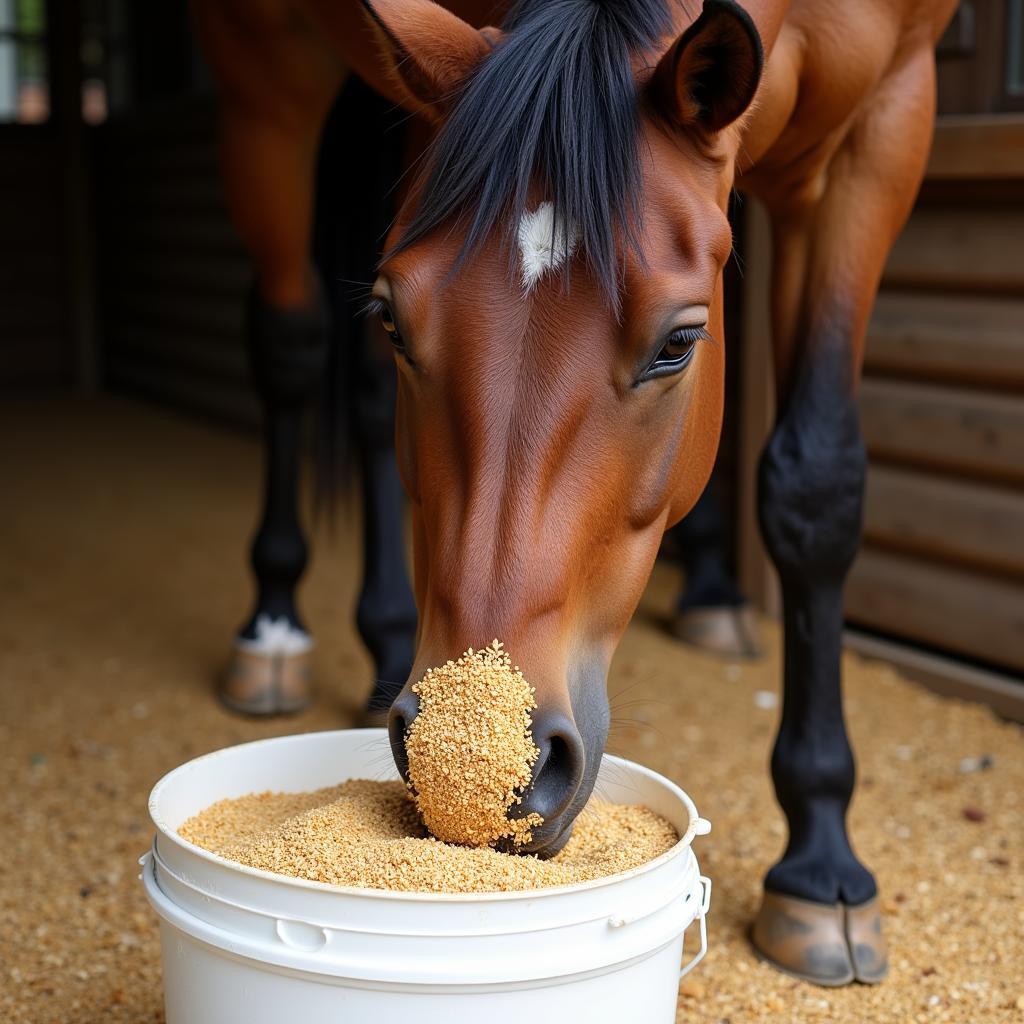Can Horses Eat Wheat? This is a common question among horse owners. While oats are a staple in many equine diets, the role of wheat is often less clear. This article will delve into the nutritional aspects of wheat for horses, exploring its benefits, risks, and best practices for incorporating it into their feed. We’ll also compare wheat to other common grains and help you determine if it’s the right choice for your horse.
Understanding Wheat in a Horse’s Diet
Wheat is a cereal grain, much like oats, barley, and corn. It’s a source of carbohydrates, providing energy for your horse’s daily activities. However, its nutritional profile differs from other grains, impacting how horses digest and utilize it. Knowing these differences is key to understanding whether wheat is a suitable addition to your horse’s feed. One concern with feeding wheat to horses is its potential to form a sticky mass in the stomach, hindering digestion. This is especially true if the wheat is processed improperly or fed in excessive amounts.
 Horse Eating Wheat from a Bucket
Horse Eating Wheat from a Bucket
Nutritional Value of Wheat for Horses
Wheat provides energy primarily in the form of starch. It also contains protein, although the quality is generally lower than that found in oats. Wheat is relatively low in fiber compared to other grains, making it less beneficial for maintaining healthy gut function. However, it can be a good source of certain vitamins and minerals, including B vitamins and phosphorus. The key is to feed wheat in moderation and as part of a balanced diet. For instance, combining wheat with high-fiber feeds like straw bedding for horses can help offset the lower fiber content.
Potential Risks of Feeding Wheat to Horses
While wheat can be a part of a horse’s diet, there are potential risks to consider. One primary concern is its high starch content, which can disrupt the delicate balance of bacteria in the horse’s hindgut. This imbalance can lead to colic, laminitis, and other digestive issues. Another risk is the potential for wheat to form a pasty mass in the stomach, especially when fed whole or improperly processed. This can obstruct the digestive tract and cause serious health problems. Finally, some horses may have allergies or sensitivities to wheat, resulting in skin reactions or respiratory issues.
Best Practices for Feeding Wheat to Horses
If you choose to incorporate wheat into your horse’s diet, doing so responsibly is crucial. Always opt for processed wheat, such as rolled, cracked, or steamed, to improve digestibility. Start with small quantities and gradually increase the amount while monitoring your horse for any adverse reactions. Never feed wheat as the sole grain source; instead, mix it with other grains and forages to create a balanced diet. Consider consulting with an equine nutritionist to determine the appropriate amount of wheat for your horse’s specific needs. They can also advise on creating a balanced diet that includes treats, like homemade horse treats with molasses.
Comparing Wheat to Other Grains
How does wheat stack up against other common horse feeds like oats, barley, and corn? Oats are generally preferred due to their higher fiber content and better digestibility. Barley is similar to wheat in terms of energy content but can also be prone to causing digestive issues if not processed correctly. Corn is highly energetic but should be fed sparingly due to its high starch content. Choosing the right grain for your horse depends on their individual needs, workload, and digestive sensitivity. You might consider incorporating a warm mash for horses into their diet for added nutritional benefits and variety.
Conclusion
Can horses eat wheat? Yes, they can, but with careful consideration. While wheat can provide a source of energy, it’s essential to be aware of the potential risks and follow best practices for feeding. By understanding the nutritional value of wheat and its potential impact on your horse’s health, you can make informed decisions about incorporating it into their diet. Remember, a balanced diet is key to a healthy and happy horse. For those looking for treat alternatives, consider exploring horse treat recipes without molasses.
FAQ
- What are the signs of wheat intolerance in horses?
- Can I feed wheat to a horse with laminitis?
- Is rolled wheat better than cracked wheat for horses?
- How much wheat should I feed my horse per day?
- What are some alternatives to wheat for horses?
- Can wheat cause colic in horses?
- Is wheat a good source of protein for horses?
Scenarios:
- Scenario 1: A horse owner is looking for a cheaper alternative to oats and wonders if wheat is a suitable replacement.
- Scenario 2: A horse with digestive issues has been struggling with traditional grains, and the owner wants to know if wheat could be a gentler option.
- Scenario 3: A performance horse requires a high-energy diet, and the owner is curious about incorporating wheat for its carbohydrate content.
Related articles:
You might also find these articles helpful: homemade german horse muffins
Need more assistance? Contact us at 0772127271 or [email protected]. You can also visit us at QGM2+WX2, Vị Trung, Vị Thuỷ, Hậu Giang, Việt Nam. Our customer service team is available 24/7.